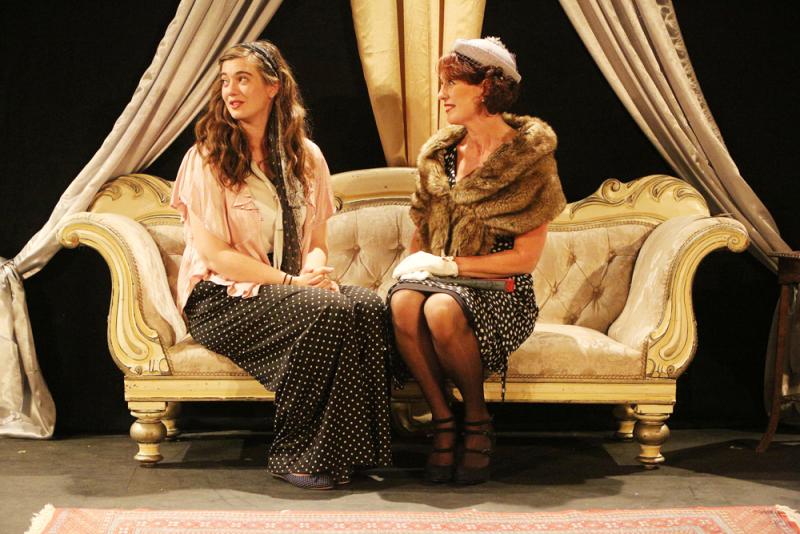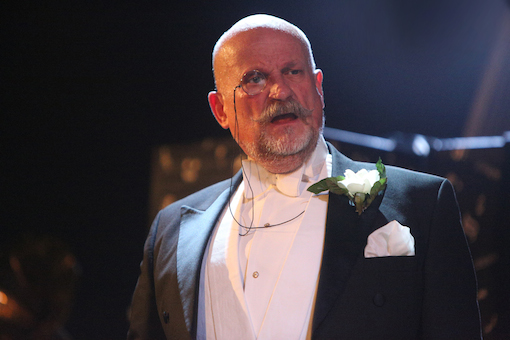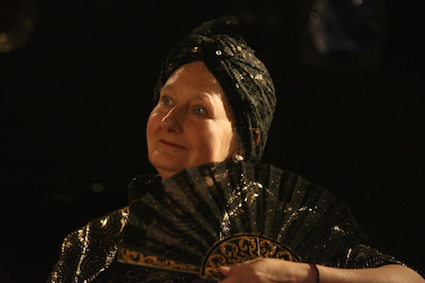Lady Windermere's Fan, King's Head Theatre | reviews, news & interviews
Lady Windermere's Fan, King's Head Theatre
Lady Windermere's Fan, King's Head Theatre
Oscar Wilde's comedy of Victorian morals receives an uneven update to the 1930s

“We are all in the gutter, but some of us are looking at the stars,” declares Lord Darlington in Act II of Oscar Wilde’s Lady Windermere’s Fan. He’s the classic Wildean cad - unprincipled, facetiously witty and in this production, possessed of the vilest pencil moustache, and yet the playwright gives him the most memorable line of the whole play. Why? To demonstrate that nobody is too completely good or bad not to be redeemed by beauty.
irst performed in 1892, Lady Windermere’s Fan was Wilde’s first society comedy and its success set him on the way to becoming one of the most popular playwrights of the age. It’s a play written about high society that was to be watched by the very people it satirised. Sparklingly funny and packed with paradoxes, it has serious undercurrents, as each character in turn is forced to compromise their ideals and abandon their morals for one reason or another.
 The action revolves around Lady Windermere, a society hostess about to throw a ball to celebrate her twenty-first birthday. However, she soon discovers that her husband (whom she married for love) has been paying vast sums of money to a Mrs Erlynne - a woman who is the subject of much society gossip for the frequent visits she receives from various different men. Believing she has lost her husband’s love, Lady Windermere flees into the arms of the wholly unsuitable Lord Darlington, and only the most dexterous of plot-twists can rescue her.
The action revolves around Lady Windermere, a society hostess about to throw a ball to celebrate her twenty-first birthday. However, she soon discovers that her husband (whom she married for love) has been paying vast sums of money to a Mrs Erlynne - a woman who is the subject of much society gossip for the frequent visits she receives from various different men. Believing she has lost her husband’s love, Lady Windermere flees into the arms of the wholly unsuitable Lord Darlington, and only the most dexterous of plot-twists can rescue her.
This production transplants the play from its original Victorian setting to the 1930s (something which was also done in the 2004 film adaptation A Good Woman, starring Scarlett Johansson). In this case, aside from introducing occasional slightly self-conscious musical numbers, it’s hard to see what this adds to the play. Graham Hoadly's performance of “And Her Mother Came Too” (pictured above right) is pleasant enough, but sits oddly amid the rest of the action. Another more positive alteration is in the interpretation of Lady Windermere. Director Linnie Reedman chose to give the character more bite, moving away from the prudish, Victorian traits hinted at by Wilde.
 Played here by Ellie Nunn (daughter of Trevor), Lady Windermere becomes confrontational and often authoritative, enabling us to see more clearly her transition from simpering moraliser to a pragmatist capable of keeping even the darkest secrets. Nunn’s range is impressive - she brings comedic touches to the simple action of sprawling on a sofa or pouring a drink, but retains enough gravitas to make her character’s emotional nadir convincing. She is ably supported by Ruth Redman as the sensuous, conniving Mrs Erlynne, while Jo Ashe (pictured above left) delights as the archetypal society scandalmonger, the Duchess of Berwick.
Played here by Ellie Nunn (daughter of Trevor), Lady Windermere becomes confrontational and often authoritative, enabling us to see more clearly her transition from simpering moraliser to a pragmatist capable of keeping even the darkest secrets. Nunn’s range is impressive - she brings comedic touches to the simple action of sprawling on a sofa or pouring a drink, but retains enough gravitas to make her character’s emotional nadir convincing. She is ably supported by Ruth Redman as the sensuous, conniving Mrs Erlynne, while Jo Ashe (pictured above left) delights as the archetypal society scandalmonger, the Duchess of Berwick.
That said, the ensemble is rather uneven. Wilde’s prose is at its best with a rhythmical, crystal-clear delivery, and both Ruari Cannon as Lord Darlington and Nathan Lubbock-Smith as the drawling Cecil Graham fall short on this front, with the consequence that some of the play’s best lines are thrown away. Plots and shifting morals aside, the real genius of this play is in its words, and as such we cannot afford to lose a single one.
rating
Explore topics
Share this article
The future of Arts Journalism
You can stop theartsdesk.com closing!
We urgently need financing to survive. Our fundraising drive has thus far raised £49,000 but we need to reach £100,000 or we will be forced to close. Please contribute here: https://gofund.me/c3f6033d
And if you can forward this information to anyone who might assist, we’d be grateful.

Subscribe to theartsdesk.com
Thank you for continuing to read our work on theartsdesk.com. For unlimited access to every article in its entirety, including our archive of more than 15,000 pieces, we're asking for £5 per month or £40 per year. We feel it's a very good deal, and hope you do too.
To take a subscription now simply click here.
And if you're looking for that extra gift for a friend or family member, why not treat them to a theartsdesk.com gift subscription?
more Theatre
 Intimate Apparel, Donmar Warehouse review - stirring story of Black survival in 1905 New York
An early Lynn Nottage work gets a superb cast and production
Intimate Apparel, Donmar Warehouse review - stirring story of Black survival in 1905 New York
An early Lynn Nottage work gets a superb cast and production
 Hercules, Theatre Royal Drury Lane review - new Disney stage musical is no 'Lion King'
Big West End crowdpleaser lacks punch and poignancy with join-the-dots plotting and cookie-cutter characters
Hercules, Theatre Royal Drury Lane review - new Disney stage musical is no 'Lion King'
Big West End crowdpleaser lacks punch and poignancy with join-the-dots plotting and cookie-cutter characters
 Showmanism, Hampstead Theatre review - lip-synced investigation of words, theatricality and performance
Technically accomplished production with Dickie Beau never settles into a coherent whole
Showmanism, Hampstead Theatre review - lip-synced investigation of words, theatricality and performance
Technically accomplished production with Dickie Beau never settles into a coherent whole
 4.48 Psychosis, Royal Court review - powerful but déjà vu
Sarah Kane’s groundbreaking play gets a nostalgic anniversary reboot
4.48 Psychosis, Royal Court review - powerful but déjà vu
Sarah Kane’s groundbreaking play gets a nostalgic anniversary reboot
 Joyceana around Bloomsday, Dublin review - flawless adaptations of great dramatic writing
Chapters and scenes from 'Ulysses', 'Dubliners' and a children’s story vividly done
Joyceana around Bloomsday, Dublin review - flawless adaptations of great dramatic writing
Chapters and scenes from 'Ulysses', 'Dubliners' and a children’s story vividly done
 Stereophonic, Duke of York's Theatre review - rich slice of creative life delivered by a 1970s rock band
David Adjmi's clever and compelling hit play gets a crack London cast
Stereophonic, Duke of York's Theatre review - rich slice of creative life delivered by a 1970s rock band
David Adjmi's clever and compelling hit play gets a crack London cast
 North by Northwest, Alexandra Palace review - Hitchcock adaptation fails to fly
Emma Rice's storytelling at fault in misconceived production
North by Northwest, Alexandra Palace review - Hitchcock adaptation fails to fly
Emma Rice's storytelling at fault in misconceived production
 Hamlet Hail to the Thief, RSC, Stratford review - Radiohead mark the Bard's card
An innovative take on a familiar play succeeds far more often than it fails
Hamlet Hail to the Thief, RSC, Stratford review - Radiohead mark the Bard's card
An innovative take on a familiar play succeeds far more often than it fails
 The King of Pangea, King's Head Theatre review - grief and hope, but no connection
Heart and soul proves insufficient in world premiere of therapeutic show
The King of Pangea, King's Head Theatre review - grief and hope, but no connection
Heart and soul proves insufficient in world premiere of therapeutic show
 A Midsummer Night's Dream, Bridge Theatre review - Nick Hytner's hit gender-bender returns refreshed
This Dream is a great night out, especially for Shakespeare first-timers
A Midsummer Night's Dream, Bridge Theatre review - Nick Hytner's hit gender-bender returns refreshed
This Dream is a great night out, especially for Shakespeare first-timers
 Miss Myrtle’s Garden, Bush Theatre review - flowering talent, but needs weeding
New play about loss, love, grief and gardening is humane, but flawed
Miss Myrtle’s Garden, Bush Theatre review - flowering talent, but needs weeding
New play about loss, love, grief and gardening is humane, but flawed
 Fiddler on the Roof, Barbican review - lean, muscular delivery ensures that every emotion rings true
This transfer from Regent's Park Open Air Theatre sustains its magic
Fiddler on the Roof, Barbican review - lean, muscular delivery ensures that every emotion rings true
This transfer from Regent's Park Open Air Theatre sustains its magic

Add comment